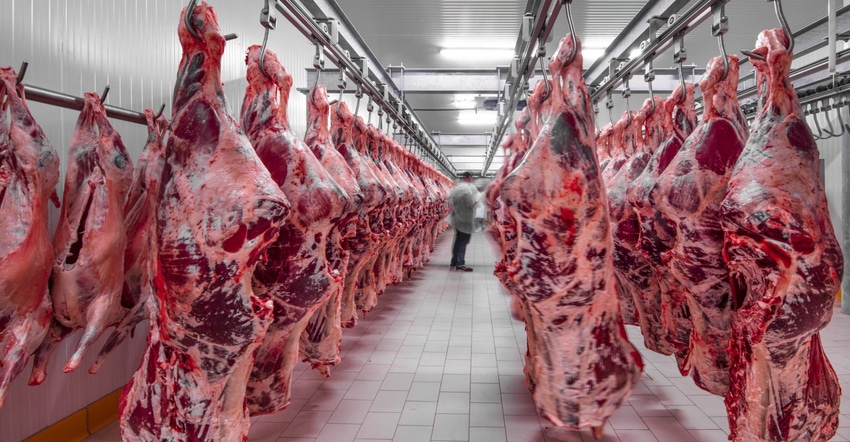
In a notice to stakeholders Tuesday evening, JBS USA and Pilgrim’s state both companies have made significant progress in resolving the cyberattack that has impacted the companies' operations in North America and Australia (note JBS owns the Pilgrim brand). The attack did reveal the vulnerability of the meat supply chain, and again garnered calls for additional oversight on the U.S. beef supply chain.
The company processes, prepares and packages meat in facilities across 15 countries. Operations have been put on hold at multiple plants across the U.S., including locations in Wisconsin, Texas and Nebraska. Operations in Mexico and the UK were not impacted and are conducting business as normal. The hacking incident was detected on May 30, when the company found servers supporting its IT systems were under attack. According to a JBS statement, the company took immediate action to suspend affected servers and notify authorities.
In the U.S. on Tuesday, JBS USA and Pilgrim's were able to ship product from nearly all of its facilities to supply customers. The company also continues to make progress in resuming plant operations in the U.S. and Australia. Several of the company’s pork and poultry plants were operational Tuesday and its Canada beef facility resumed production.
Related: JBS hit by cybersecurity attack
Systems are coming back online and “JBS USA is not sparing any resources to fight this threat,” the company says. Given the progress IT professionals and plant teams have made in the last 24 hours, the vast majority of the beef, pork, poultry and prepared foods plants were to be operational by Wednesday.
“JBS USA and Pilgrim's are a critical part of the food supply chain and we recognize our responsibility to our team members, producers and consumers to resume operations as soon as possible,” says André Nogueira, JBS USA CEO.
JBS USA says it has received strong support from the U.S., Australian and Canadian governments, conducting daily calls with officials in an effort to safeguard the food supply.
White House Deputy Press Secretary Karine Jean-Pierre told reporters that JBS notified the Biden administration of the ransom demands and the company believes the cyberattack stemmed from a criminal organization likely based in Russia. Jean-Pierre says the White House is engaging directly with the Russian government, delivering a message that “responsible states do not harbor ransomware criminals.”
The FBI is investigating the incident, and the Cybersecurity and Infrastructure Security Agency is offering technical support to JBS.
In a statement, USDA says it continues to work closely with the White House, Department of Homeland Security, JBS USA and others to monitor this situation closely and offer help and assistance to mitigate any potential supply or price issues.
“As part of that effort, USDA has reached out to several major meat processors in the United States to ensure they are aware of the situation, encouraging them to accommodate additional capacity where possible, and to stress the importance of keeping supply moving,” USDA says.
USDA has also been in contact with several food, agriculture and retail organizations to underscore the importance of maintaining close communication and working together to ensure a stable, plentiful food supply. "USDA will continue to encourage food and agriculture companies with operations in the United States to take necessary steps to protect their IT and supply chain infrastructure so that it is more durable, distributed and better able to withstand modern challenges, including cybersecurity threats and disruptions," USDA says.
Related: Livestock groups unite on need to address cattle markets
“Cyber security is a real threat to our worldwide economy and certainly is a concern in agriculture,” says Ernie Birchmeier, livestock and dairy specialist at Michigan Farm Bureau. “The ability for criminals to impact an industry and cause market disruption poses a direct economic impact on our farmers who rely on the processing and distribution industries to keep our food system functioning effectively and efficiently.”
“There will certainly be short-term market impacts that negatively impact our farmers,” Birchmeier adds. “This incident serves as a reminder that we all need to take proactive steps to protect our businesses. We saw the impact of supply chain disruption during the COVID-19 pandemic and we can ill afford a repeat of that scenario.”
Further action sought
This attack comes on the heels of another major hacking incident against the Colonial Pipeline, causing the oil pipeline to shut down for nearly a week and spiking gas prices across the U.S.
Sen. Deb Fischer, R-Neb., says it’s alarming to see another cyberattack against a crucial supply chain.
“The fact that nearly 20% of U.S. meat processing capacity can go offline due a single event could be a hit to Nebraska’s economy, the cattle market as whole, and consumers across America. I will continue to monitor this closely as more facts come to light,” Fischer says.
Fisher has been outspoken about the need to further address market concentration issues within the cattle market and introduced legislation to provide additional transparency for cattle producers of prices paid by the processors.
Related: Senators introduce fix for cattle market price discovery
“The cyberattack on JBS that’s wiped out one-fifth of the United States’ beef processing capacity underscores the need for reform in the marketplace – food safety and security are now at extreme risk and America cannot afford to stand idly by as the U.S. beef market and the food supply is further decimated,” says Marty Irby, executive director at Animal Wellness Action.
The Animal Wellness Action as well as the Organization for Competitive Markets called on the Biden administration, Attorney General Merrick Garland and Agriculture Secretary Tom Vilsack to “end the monopolization of agriculture in America.”
About the Author(s)
You May Also Like






